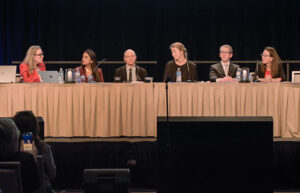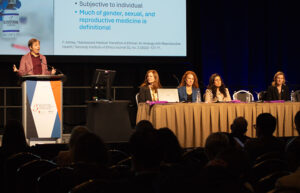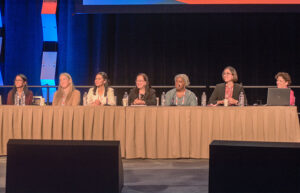BASIC SCIENCE WORKSHOP
Tuesday, December 6 • 8:00 am – 9:45 am CT • Stars at Night Ballroom 3&4
Presentation: Therapy-induced senescence: Friend or foe?
Sheila A. Stewart, PhD
Gerty Cori Professor and Vice Chair, Department of Cell Biology & Physiology
Associate Director for Basic Sciences, Siteman Cancer Center
Washington University School of Medicine, St. Louis, MO

What is your presentation about?
We are interested in how the metastatic tumor microenvironment (NOT tumor cells) impact tumor progression and remodel the immune response. We found that the p38MAPK pathway in stromal cells contributes to tumor progression. Thus, we embarked on trying to understand how the microenvironment impacts progression and to use that information to design preclinical models to limit metastatic breast cancer progression. In doing so, we identified a combination of p38 inhibition and T cell activation through the use of an agonist against OX40. This combination approach, in the presence of an experimental CD8 T cell antigen, led to a cure and durable immunologic memory. Given that we see tumor microenvironmental signatures that are similar in human metastatic lesions, we suggest that this approach could have an impact in human disease.
What makes this topic important in 2022?
We have known for years that targeted therapies require a detailed understanding of the tumor microenvironment and our approach provides insight into this important component of breast cancer. Our data argue that p38 inhibition is as potent as chemotherapy as a single agent with significantly fewer side effects. However, when combined with immunotherapy, we observe a significant reduction in tumor progression. We think this approach, detailing the tumor microenvironment, will be important to the future design of effective therapies.
How/why did you become involved with this area of breast cancer research?
I have been interested in how nontumor cells impact tumorigenesis for a long time, as I feel that a coordinated attack on cancer (tumor targeted modalities in combination with stromal and immune modulatory agents) will eventually result in durable responses. Given metastatic disease is what remains intractable, I wanted to specifically understand the metastatic stromal compartment.
Presentation: Clinical implications of tumor heterogeneity single cell genomics
Nnennaya Kanu, PhD
Principal Research Fellow
UCL Cancer Institute, University College London
London, England, UK

What is your presentation about?
I will be talking about DNA replication timing alterations during the evolution of breast cancer and the impact on the acquisition of mutations.
What makes this topic important in 2022?
Because altered replication timing might be a response to DNA damage and replication stress, it may need to be considered in light of the mechanism of action of some therapeutic treatments.
How/why did you become involved with this area of breast cancer research or care?
Because although over the last decade there have been many advances in how to treat, prevent, and diagnose breast cancer, there are still many underexplored aspects of this complex disease. One of these areas is the contribution of alterations in replication timing on the genomic landscape during the evolution of breast cancer, which I have been studying for the past 5 years.





